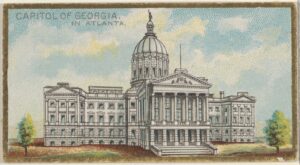On April 27, 2020, the Supreme Court affirmed the judgment of the Court of Appeals for the 11th Circuit which had held that the annotations of the Official Code of Georgia Annotated (OCGA) are not protected by copyright.
The OCGA is the official code of the State of Georgia and includes the Georgia statutes in force and non-binding supplementary material, including annotations, such as summary of judiciary decisions or a list of relevant legal articles.
The Code Revision Commission assembles the OCGA, and is composed of the Lieutenant Governor of Georgia, four Georgia senators, four Georgia representatives, the Speaker of the House, and five members appointed by the state of Georgia.
However, it is a private organization, Matthew Bender & Co., Inc., a division of the LexisNexis Group, which prepares the annotations under a work-for-hire agreement. As such, Georgia is the copyright owner of the annotations.
While the annotated version of the Georgia Code is made available for free on the LexisNexis site, the OCGA is protected by a paywall. Public.Resource.Org (PRO) is a non-profit organization aiming to facilitate public access to government records and legal materials. It scanned a copy of the paper version of the OCGA and posted it on its freely accessible site.
The Commission sent PRO several letters asking for the copy of the OCGA to be taken down from its site. As the non-profit refused to do so, the Commission filed a copyright infringement suit.
The Northern District Court of Georgia held that the annotations were protected by copyright as they are not “enacted into law.” The US Court of Appeals for the 11th Circuit reversed, reasoning that it is not the Commission which is the author of the OCGA, but rather, the People, while judges are legislators are only “draftsman… exercising delegated authority.”
The Supreme Court affirmed, but Chief Justice Roberts, who delivered the opinion of the court, followed a different reasoning than the 11th Circuit judges.
The Court cited the government edicts doctrine, under which judges cannot be the authors of the works they produce in the course of their official duties as judges and legislators. This doctrine was developed by three 19th century cases, Wheaton v. Peters (1834), holding that a court reporter cannot have a copyright in the Court’s opinions, Banks v. Manchester (1888), holding that “the judge who, in his judicial capacity, prepares the opinion or decision, the statement of the case and the syllabus or head note” cannot be the author of the work and thus cannot hold its copyright, and finally Callaghan v. Myers (1888), holding again that a court reporter cannot have a copyright in the Court’s opinions.
For the Court, “[i]f judges, acting as judges, cannot be “authors” because of their authority to make and interpret the law, it follows that legislators, acting as legislators, cannot be either.”
The Commission can be qualified as a legislator, as it “functions as an arm of [the Georgia Legislature] for the purpose of producing the annotation…[and] serves as an extension of the Georgia Legislature in preparing and publishing the annotations.” The Commission creates the annotation in the discharge of its legislative duties, in its role as an adjunct to the Legislature.
Justice Ginsburg dissented, taking the view that “the annotations are not created contemporaneously with the statures to which they pertain,” that “are descriptive rather than prescriptive,” and that they are only “given of the purpose of convenient reference.” Justice Sotomayor, who joined the opinion of the Court, noted during the debates that dictum is not law either.
The State of Georgia had argued that §101 of the Copyright Act lists “annotations” as works eligible for copyright protection. This argument did not convince the Court, as §101 does not state that annotations prepared by a judge or legislators can be protected.
A amicus curia brief filed by the American Library Association argued that “[t]he LexisNexis unannotated code fails to provide meaningful citizen access to Georgia law.“ It further noted that the online code can only be accessed after agreeing to a clickwrap, which states that the State of Georgia “reserves the right to claim and de-fend the copyright in any copyrightable portions of the site,” but that once on the site, the user is not able to understand which part of the Code is protected by copyright or not. The brief also noted that such a scheme “undermin[es] libraries’ longstanding commitment to patron privacy.”
Georgia had argued that, if these annotations are not protectable, it would not be able to induce private organizations, such as LexisNexis, to preparer such work. Chief Justice Roberts wrote “[t]hat appeal to copyright policy, however, is addressed to the wrong forum,” as it is Congress, not the courts, which must decide the best ways to pursue the objectives of the Copyright Clause of the US Constitution.
The issue of public access to law is an important issue, and it remains to be seen if this case will advance or hinder it.



